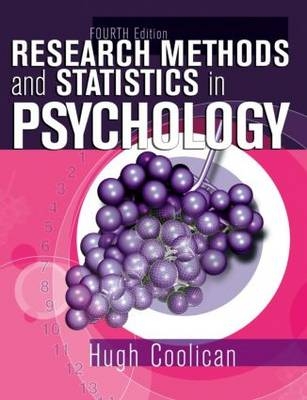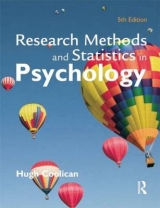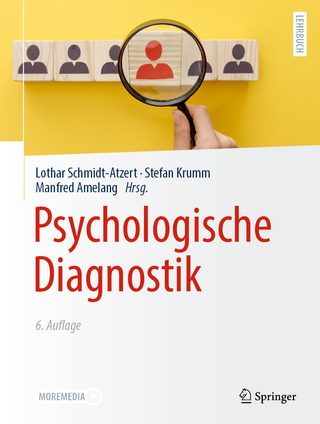
Research Methods & Statistics in Psychology 4th Edition
Hodder Arnold (Verlag)
978-0-340-81258-7 (ISBN)
- Titel erscheint in neuer Auflage
- Artikel merken
Research Methods & Statistics in Psychology, 4th edition, has been substantially revised and updated, and provides a clear and comprehensive survey of research methods, statistical concepts and procedures in psychology today.
Clear explanations of experimental and non-experimental designs are provided and there is detailed attention to a wide range of threats to internal and external validity. Quasi-experiments, cross-cultural issues, ethics and the ongoing quantitative-qualitative debate are all fully explored.
Statistical procedures are given clear and comprehensive coverage, and include everything needed at all levels of study - from nominal level tests to multi-factorial ANOVA designs and multiple regression. New to the fourth edition are log linear analysis and a detailed examination of effect size and power, enabling students to report very easily the level of power for their findings.
Also new for this edition are detailed and illustrated SPSS instructions for all statistical procedures covered in the book, including data entry and interpreting output, thus eliminating the need for an extra SPSS textbook.
Each chapter contains a self-test glossary, key terms and exercises. Advice on planning and conducting studies, analysing data and writing up practical reports is given, and a 'good' marked report is included, as well as a complete published qualitative report. A much-requested new feature is advice, for each statistical test, on how to report results in conventional (APA) style.
The bestselling research methods text for over a decade, Research Methods & Statistics in Psychology, 4th edition, remains accessible, informative and invaluable to students of psychology and related disciplines at all levels.
Hugh Coolican is Principal Lecturer in Psychology at Coventry University, a Chartered Psychologist and an assistant examiner for the International Baccalaureate.
Preface
1. Psychology and research
Science and psychology
What is research about?
Theory
Hypothesis
Prediction
Empirical and hypothetico-deductive methods
How pscyhologists do research
The research cycle
Planning research
2. Measuring people - variables, samples and the qualitative critique
Variables
Constructs
Operational definitions
Reliability and validity
Populations
Samples
Sampling bias
Equal probability selection
Random and non-random samples
The qualitative critique and the quantitative-qualitative debate
3. Use of experimental designs in psychology
True experiments
Independent and dependent variables
The strength of experiments - improving on bad experiments and eliminating causal directions
Critique of the experiment
Simple experimental designs, independant samples, repeated measures, matched pairs and single participant designs
Releated and unrelated designs
Factors
4. Validity in experiments, quasi-experiments and non-experimental methods
Interpretation of experiments, sources of variance
Internal and external validity
Confounding - extraneous variables and expectancies in research
Field work and quasi-experiments
Non-experimental research
Control and validity in the laboratory and in the field
5. Observational methods – watching and being with people
Observation as technique or overall design
Structured observations
Controlled and naturalistic observation
Qualitative observation
Role-play, simulation and diary methods
Participant observation
Case studies
Indirect observation
6. Interview methods – asking people direct questions
General questioning issues, structure and disguise
Interpersonal variables
Interview types
Semi-structured interviewing techniques
Achieving rapport
Recording techniques
Surveys
Modes of questioning
7. Questionnaires – using psychological scales and tests in research
Questionnaires and attitude scales
Scale items, styles, problems and pitfalls
Constructing an attitude scale
Projective tests
Psychometrics – intelligence and personality tests, factor analysis
Reliability, validity and standardisation of tests including use of SPSS to conduct a reliability analysis
8. Comparison studies – looking across, looking ahead and looking abroad
Cross-sectional studies
Longitudinal studies
Cross-cultural studies
Ethnocentrism and other issues in cross-cultural research
Readings on culture and 'race' in psychological research
9. Qualitative approaches - problems with positivism
Psychology and the positivist paradigm
Objections to the conventional paradigm
Proposals of the qualitative approaches
Examples of qualitative approaches
Contemporary qualitative methods
10. Statistics – organising the data
Various levels of measurement
Measures of central tendency
Meaures of dispersion
Population, samples and sampling error
Frequencies and distributions
Graphical representation of data
The normal distribution, areas, z values
Percentiles, deciles and quartiles
Sampling distributions and standard error
Skew and kurtosis
Checking for normality
Introduction to SPSS procedures, data entry and descriptive statistics
11. Significance – was it a real effect?
Significance testing, the null and alternative hypotheses
Probability
Levels of significance
Significance testing and rejection regions
Power and effect size
Type I and Type II errors
Directional hypothesis and one or two-tailed tests
12. Testing differences between two samples
Parametric tests
t test for related and unrelated data
Single sample t test
Data assumptions for t tests
Effect size and issues of power in significance testing
Non-parametric tests of difference - Wilcoxon matched pairs and Mann-Whitney U
Sign test for categorical data
SPSS procedures for two condition difference tests
13. Tests for categorical variables and frequency tables
Part 1: Chi-square
One variable, two category test
2 x 2 frequency tables
General Chi-square for R x C designs
Goodness of fit test
Effect, size and power
Limitations on the use of Chi-square
SPSS procedures
Part 2: Log-linear analysis
Multi-way tables
Main and interaction effects
SPSS procedures
14. Correlation – the assoc
| Erscheint lt. Verlag | 30.4.2004 |
|---|---|
| Zusatzinfo | 75 |
| Verlagsort | London |
| Sprache | englisch |
| Maße | 189 x 246 mm |
| Themenwelt | Geisteswissenschaften ► Psychologie |
| ISBN-10 | 0-340-81258-3 / 0340812583 |
| ISBN-13 | 978-0-340-81258-7 / 9780340812587 |
| Zustand | Neuware |
| Haben Sie eine Frage zum Produkt? |
aus dem Bereich



